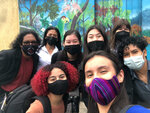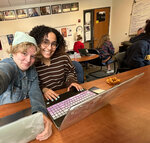




Across many cultures and generations, storytelling has played an immense role in our understanding of the world. It is the tradition of storytelling in all its unique forms that connect us all.
Storytelling contains the capacity to establish identity, fight to preserve and provoke change. In our current culture it seems that this tradition has taken a different shape. Stories are to be captured in no longer than eight seconds; about the time of the average person’s attention span. This shift can sound as if value is lost, but that is simply untrue. People, especially of my generation, can scroll and still want to read the paper. The truth is, people will always need stories and storytellers that adapt and change as the world does.
People often express that their distaste for journalism is due to a lack of trust. Each of us have our own preconceived notions and biases. Thus we tend to pay attention to stories that align with our personal values and beliefs. At the same time, many seek journalism that is as unbiased as possible. Unbiased journalism is the kind of work I strive to create. Stories that tell the truth, and represent multiple points of view, so that you the reader can form your own opinion.
It is equally important for journalists to care about storytelling. Along with trust, people want to know that reporters care about their beats, and the communities they represent. As racial injustice, inclusivity and diversity are topics that are beginning to be brought up more frequently and openly, the world of journalism has leaned into stories that relate.
Though this can be extremely positive, it also presents challenges. Who is telling these stories? Do they care? And do they really understand?
As a biracial, Black woman, I often explain that I have two sides of history that exist within me. One of the oppressed and oppressor. This does not at all sum up what it is to be biracial, and I do make light of the statement. I am proud of being biracial, and of being Black. What it does mean, however, is that my experiences with race and culture are very nuanced, and I am fortunate to have this awareness. To understand the ways in which I am privileged, along with negative ways in which I have been and can be perceived in the world. As a Black journalist, I strive to write stories of the multitudes of BIPOC communities in a way that uplifts, honors, respects and are true.
Local journalism is highly encouraged for new journalists that are excited about reporting. In order to write good stories we must start in our own backyards. But it’s more than that. Our “backyards” are full of rich history, and wonderful people, organizations and businesses that do amazing things each day. Sometimes you have to be a tourist in your own home state to be able to see what already exists with clarity. I love writing about our Twin Cities communities like Como, Midway, Frogtown, Longfellow, and Nokomis because I am able to do just that.
As a 21-year-old journalism student, I have been fortunate to travel to countries like Guatemala and Belize through study abroad programs at Bethel University. Traveling has challenged my writing and storytelling abilities, and allowed me to experience the world in ways I never would have before. I’ve seen how Guatemalan families persevere after a volcano eruption took many lives and destroyed entire neighborhoods. How communities in Belize thrive using resources from the jungle, and more. I feel extremely fortunate of the travel experiences I’ve had, and even more grateful for the relationships formed.
I can say first hand that, yes, people of my generation do care about journalism.
We do want to engage in our communities and have awareness of what things currently and historically are affecting the world. Gen Z has the negative connotation that we’re hyper aware and hyper sensitive. What may be viewed as a weakness is our greatest strength. We care, seek the truth, and are outspoken about it. That being said, there is always room for all of us to learn and be open to constantly learning, changing and growing, myself included. The transition to digital is clearly what our generations are leaning towards, though no one can deny the glorious feeling of the turn of a page. The beautiful thing is that they can coexist and continuously evolve.
Born and raised in Saint Paul, Talia McWright is incoming senior at Bethel University, majoring in journalism with a minor in creative writing and studio art. She believes that journalism is alive and well, and will continue to thrive as there are many stories deserving to be told, and readers awaiting.
Comments
No comments on this item Please log in to comment by clicking here